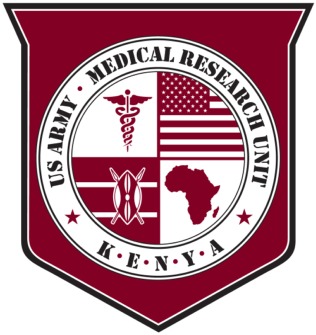


Malaria Vaccine Program
Basic Sciences
|
Muriithi-Wellde CRC |
Malaria Vaccine Trials
| Malaria Drug
Study |
Previous & Proposed studies
The USAMRU-K sites west of Kisumu have hosted the earliest and most success-ful malaria vaccine clinical trials in East Africa. R32LR Tox A was evaluated by ????? Sherwood in 1990, SPF66 by Patrick Duffy in 1997, RTS,S by Jose Stoute in1998 and Mark Polhemus in 2005 and MSP-1 by Stoute in 2002 and Mark Withers in 2003-2005).
The world’s most promising pre-erythrocytic (pre-blood stage) and erythrocytic (blood stage) vaccine candidates against Plasmodium falciparum (known as RTS,S and MSP-1, respectively) have both undergone phase Ib safety clinical trials in Kombewa and continue to be actively evaluated there in ongoing phase IIb efficacy trials. A pre-erythrocytic malaria vaccine targets sporozoites with the intent of eliminating them from the circulation or from infected hepatocytes leading to sterile immunity. As a follow on to the recently reported RTS,S trial in Mozambique, which showed unprecedented efficacy against severe disease and death in children, RTS,S is currently undergoing a trial at Kombewa which evaluates the effect upon efficacy of two competing adjuvants in adults. An alternative to the pre-erythrocytic approach is the erythrocytic vaccine merozoite surface protein 1 (MSP-1) which capitalizes upon the apparent fact that natural protection against clinical disease in adults is dependant upon maintenance of high antibody levels to antigens present on the form of the parasite (merozoite) circulating in the bloodstream. The MSP-142 fragment of the 3D7 clone of P. falciparum was evaluated in the formulation FMP1/AS02A and subsequently proved safe and immunogenic in two trials conducted in 60 malaria-naïve volunteers in the United States. The first phase Ib trial of FMP1/ AS02A in a malaria-experienced population was undertaken in 2002-3 at Kombewa & produced encouraging safety and immunogenicity data in 20 adults. This was followed in 2003-4 by a phase Ib trial of the same test article in 90 young children in the same area which produced similarly encouraging results. Now, an ongoing phase IIb efficacy trial in 200 children will determine the feasibility of our long-term malaria vaccine development plan: to develop a product to prevent malaria morbidity and mortality in infants and young children.
Entomology & Vector Borne Diseases
Malaria Clinical Studies
Basic Sciences
Malaria Drug Studies
Malaria Vaccine Trials
HIV / AIDS
Research
Care and Treatment
Administration
Information Technology
Library
Center of Excellence (CoE)
Office of Regulatory Affairs
Employment
Links
Capacity Building
Visitor information
Medical Care / TRICARE
Areas of special interest
Contact Information
News & Events
USAMRU-K Mail